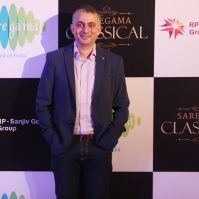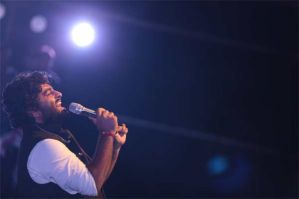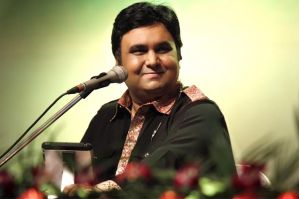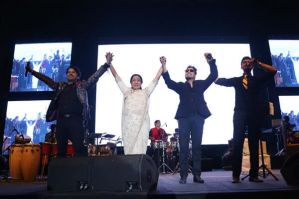Pankaj Udhas - "Music channels are not supporting sensible music"

Pankaj Udhas, the voice behind many soulful ghazals like �Chandi jaisa rang hai tera', �Aur ahista' has mesmerized ghazal lovers for over two decades with his intoxicating numbers. Having delivered 38 albums, the singer has also left his footprints in Bollywood with unforgettable songs like �"Chitthi Ayi Hai', �Phir Teri Kahani Yaad Kahani Ayi'.
The singer narrates his remarkable journey in the ghazal world, the flak he faced for being experimental, his stint in Bollywood and the diminishing ghazal genre in a conversation with Radioandmusic.com's Anita Iyer.
You recently launched a spiritual album with Times Music, a first for you in a career that spans about 38 albums.
The spiritual genre has been very personal to me, I practise religion but never tried my hand at a devotional album. About 25 years ago, a friend had given me a book of �Hanuman Chalisa' and I have carried that book since then. I have carried the same copy for all these years and it gives me tremendous amount of security.
It was in November 2008 while watching the terror attacks on Mumbai that I started reciting Hanuman Chalisa to get a sense of protection. When Times approached me to cut an album on Hanuman Chalisa, I could not resist it.
You have been criticised by purists for experimenting with the original form of ghazals?
Why single out ghazal singing? Indian classical music has undergone much experimentation too. Today, it has reached a stage where Indian classical musicians perform at Hard Rock Caf?© too. Shastirya sangeet fascinates international artistes and there are collaborations between Indian musicians with artistes abroad. We have classic examples like Amjad Ali Khan sahib performing with the Scottish orchestra.
On similar lines, the ghazal is traditional folk and has undergone research and experimentations to become more acceptable among the masses. When I started singing in the 1980s, I resolved to make this folk music as popular as possible. I experimented in the use of instruments, musical compositions, mode of style and other areas. Over the years, many have appreciated my efforts for making the genre popular but also have criticised me on the basis of 'pure and impure' ghazal but have themselves failed to distinguish between the two. People used to raise eyebrows when Begum Akhtar sang the ghazal in thumri andaaz…
You have made appearances in some Bollywood movies, how has your journey in Bollywood been?
I always wanted to be a ghazal singer but there was hardly any scope then, so the obvious alternative was films. But Bollywood in those days was ruled by veterans like Rafi, Mukesh and Kishore with hardly any opportunity for a newcomer. I remember singing for a film- Kamna and later never got an offer again! I gave up the idea of singing for films and started singing ghazals abroad which gave me instant recognition. It was then that "Chitthi Ayi Hai" came my way. After the success of Chitthi, I even appeared in movies like Saajan and Phir Teri Kahani Yaad Kahani Ayi. I could have started my innings in Bollywood after that but I am very passionate about ghazal singing and didn't want to get diluted in Bollywood.
Do you consider �Chitthi Ayi Hai' as turning point of your career?
I started my career as a singer in 1980 and �Chitthi Ayi Hai' came to me at the end of December 1985. Before the release of �Chitthi Ayi Hai' in August 1986, I released an album titled �Aafreen', a two cassette set with a compilation of 14 of my ghazals. The music company, Which had launched the album with one million copies sold out within a span of 10 days.
I recall before the film was released, a newspaper ad mentioned a picture of Sanjay Dutt, Kumar Gaurav, and there was also a picture of mine mentioning 'also featuring Pankaj Udhas'. So I would say the song brought me to the common masses who were not essentially ghazal patrons.
Any memorable incident during your performances that you can narrate for us?
In March 1986, I was doing concerts in America and a memorable incident took place at one particular concert at Madison Square, New York, there were about 7,000 people at the concert. During the interval, I pulled out the lyrics of the song Chitthi aaye hai. I remember the producer Rajendra Kumar had asked me not to perform this song anywhere until the film released in India. Assuming that I am performing in New York and the producer is back in India, I presented this song to the audiences there. After I finished the song, there was silence in the auditorium for a few seconds and I thought people didn't like the song. But suddenly, all of them began applauding, crying and the clapping continued for three to four minutes.
Did the producer ever know about you performing �Chiti aaye hai' before the release in India?
After about half an hour, I got a call from Rajendra Kumarji and it really shocked me when he said, Pankaji aap ne toh gana gaa diya!... and I apologised for it. He said that it is good as we now know the public feedback before the release. Apparently, his friend was in the audience and reported the incident to Rajendraji. Rajendra Kumar then insisted that I perform the song everywhere in America till the last leg of the tour.
You mentioned some time back about your album selling one million copies… what is your take on the current dwindling sales?
The music industry is at a very depressing stage. In the entertainment area, the business which has suffered the most is the music industry because cinema still has collections of Rs two to three billion. As far as music is concerned, there was a time when millions of audio prints were sold, but today even for a big film, the music sells only 25,000 copies.
When it comes to physical sales, albums by every artist are suffering. The only optimistic line is that mobile companies are giving returns from the digital arena. The whole pleasure of selling physical CDs is gone and I have a feeling CDs are on the way to extinction too. In the next few years, CDs will go out completely and a new format of straight downloads on your music players will emerge.
Also online piracy is getting very rampant and it is such a wide medium that it is difficult to police it as there are millions of pirates out there. But if we develop a sustainable model for generating revenues from internet downloads, the revenues would be huge but it will take time for that phase to come.
Do you think songs carry the same importance in today's films?
I can guarantee you that in some years there will be no music in cinema. In the current trend the movies hardly have two to three songs and among them, one is an item number, one song for the background and the whole concept of lip sync by actors is gone.
In earlier times, there used to be a Mohammed Rafi as Shammi Kapoor's voice, Kishore Kumar was the voice of Rajesh Khanna and so on. Today, we don't have any identification because today films release on the lines of Hollywood with limited scope for music. In three or four years, you might have one title song and one item song because today's audiences don't want it.
We hardly see any ghazal music in Bollywood nowadays…
Basically, the genre of film music needs to be revamped. Film music has become completely corrupt as far as lyrics are concerned. When you copy Japanese and Taiwanese songs, how can you expect melodies? Ghazal is the best form of music which boasts of good lyrics, music with a combination of poetry and melody. There are few musicians who are creating some great music and have composed ghazals as well, not everyone is capable of composing ghazals. There is no support for non film music from electronic media as they play only Bollywood.
Do you hold the electronic media responsible for the ghazals losing out to popular music?
Music channels are not supporting sensible music, they are running after eyeballs. These music channels are losing their TRPs and are finding it difficult to sustain because they are not showing non-film music. There was a craze for MTV and channel [V] some years back because they showcased a variety like ghazals, international music, non film etc. But today they play only film songs which is available on any GEC, so why would anyone come to music channels?
What is the status of ghazal music today- is it flourishing or diminishing?
When I started singing ghazals in 1976, people used to ridicule me when I mentioned I want to make a career out of ghazal singing. In 1970s, the ghazal genre was revived and today is one of the most popular genres in the country. It has been around for a long time and there is no way that you can just erase or wipe it off. But the point is the focus on ghazals is lost. The music gaining focus today are the dance numbers. The day people realise that they have had enough of dance, other genres would be noticed.
Although we have many young talented singers, nobody is keen to don the �ghazal singer's hat…
The lure of cinema and dance numbers is so huge that youngsters get carried away. Also, platforms like Indian Idol and other reality shows stress on popular music and we don't have a reality show for ghazal music. Ghazals requires sincerity and tremendous amount of hard work, you have to learn Indian classical music, get a hold on Urdu and need a lot of riyaaz. And the other option is to get on to Indian Idol and get fame in 15 minutes. What would you prefer?
















